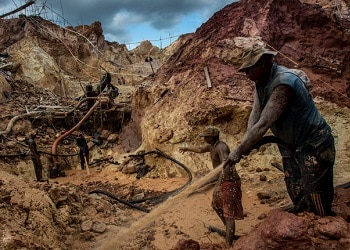Outbreaks of malaria and diphtheria in a region of Venezuela where these diseases are rare has revealed how armed groups are organizing a vast migration to illegal mines.
The outbreaks show that criminals operating in the state of Miranda found a way to make money amid the country’s worsening crisis by moving into the illegal gold mines of Bolívar state, in the south of Venezuela.
In the middle of 2017, doctors witnessed an unusual, sustained and inexplicable malaria outbreak in Valles del Tuy, a region in the state of Miranda located between the coast and the center of Venezuela where the mosquito-borne disease is seldom seen, Efecto Cocuyo reported.
The startling epidemic offered the first clue to the changing criminal dynamics in the region.
SEE ALSO: Venezuela News and Profiles
“Malaria was not a disease native to states in the center of the country, so this caught our attention. We started to ask patients about it to find out how they contracted it. The surprise came when one of the patients told me that he had caught it in the mining region in the state of Bolívar, where they went to work in gold mining”, explained a doctor whose practice is in Charallave, the municipal seat in Cristóbal Rojas municipality in Miranda state. The doctor asked to remain anonymous for security reasons.
Pressured by the economic situation and massive inflation, residents of the Valles del Tuy region began working during their vacations in the illegal mines in Bolívar, more than 500 kilometers away. The doctor said that they were recruited by pranes, or prison gang bosses, who had previously been the leaders of local megabandas in Valles del Tuy.
The megabandas’ grip on Valles del Tuy began in 2013, when various sites were converted into so-called peace zones, areas where security forces could not enter.
Later, when kidnappings and extortion stopped being profitable in the poor areas where they operated, members of the same megabandas migrated to the mining region in search of other sources of income, and to escape police and military raids.
InSight Crime Analysis
Criminals are not immune to the effects of Venezuela’s current economic, political and social crisis.
Many criminals, primarily pranes and leaders of megabandas, have been forced to abandon their former strongholds and change the pattern of their criminal activities, according to investigations conducted by InSight Crime.
Criminals are trading robbery, petty theft, and kidnappings for drug trafficking and illegal mining. Additionally, they are migrating to states where these illicit economies are strongest: Sucre, Zulia, Táchira and Bolívar. In the south of Venezuela, Bolívar has become the principal destination for the pranes of Valles del Tuy.
Ramón Terán Rico, alias “Monchi,” for example, was the leader of one of the largest criminal organizations in the state of Miranda. Community representatives told InSight Crime that he fled to Bolívar’s mines two years ago.
Monchi was the first crime boss to try his luck at the Orinoco Mining Arc, a transnational mining project created in 2016. He gradually moved his henchmen there from the Valles del Tuy. Sources in his circle of friends say that he even purchased his own dredge to extract gold.
Leaders of other criminal structures operating in the Valles del Tuy have also had to reinvent themselves in order to survive, and have moved into southern Venezuelan states where they operate comfortably.
Hundreds of residents of the towns in Valles del Tuy have migrated to the mining region. “All of the families here have at least one person that has gone to work in the mines,” said a resident of Ocumare del Tuy in Miranda state, who reports seeing his neighbors’ children and relatives head for the mines.
In November 2016, a case of diphtheria, an acutely infectious disease of the throat, was detected in the Súcuta sector of Ocumare del Tuy, alerting health authorities to the re-emergence of a disease rarely seen in the center of the country.
Follow-up with the patient found that he had contracted the infection in the Bolívar mines.
Health authorities developed prevention plans targeted at the neighborhoods where criminal groups operate. Investigations conducted by health authorities demonstrated that the men that go to work in the mines, as well sex workers or women who work in the kitchens there, carried these diseases back to the Valles del Tuy.
The public health problem shed light on the fact that an illegal gold mining fever had emerged — an economic lifeline that is now strengthening organized crime.

